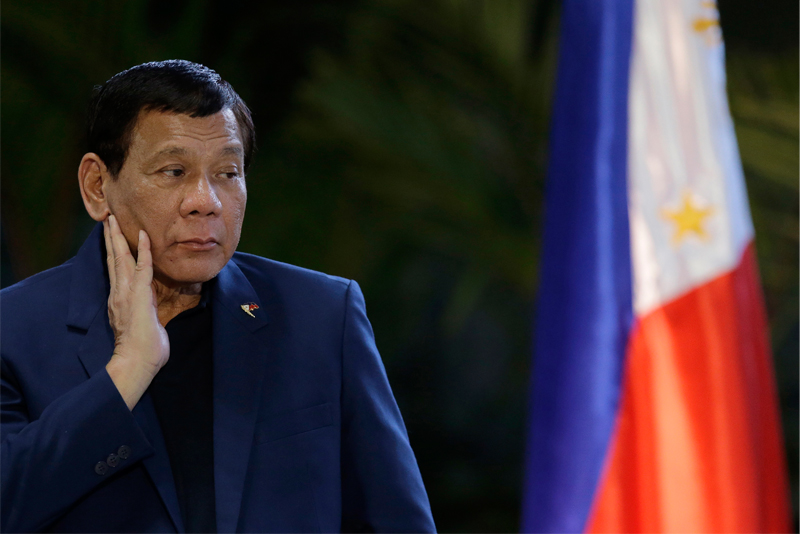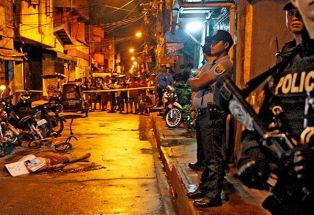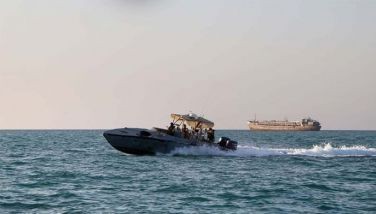Palace: No reason to fear martial law

Philippine President Rodrigo Duterte listens to questions from reporters as he arrives at Manila's international airport, Philippines, Wednesday, May 24, 2017. Duterte warned Wednesday that he'll be harsh in enforcing martial law in his country's south as he abruptly left Moscow to deal with a crisis at home sparked by a Muslim extremist siege on a city, where militants burned buildings overnight and are feared to have taken hostages. AP/Aaron Favila
MANILA, Philippines - The public has no reason to be anxious about the martial law declared by President Duterte in Mindanao, as this would only strengthen the hand of government in dealing with terrorists without hampering the operation of democratic institutions, Malacañang said yesterday.
Defending Duterte’s move ahead of the full security briefing by the President’s team before the Senate and the House of Representatives, chief presidential legal counsel Salvador Panelo stressed that martial law for Mindanao “does not suspend the operation of the Constitution, nor supplant the functioning of the civil courts or legislative assemblies…”
He added the martial law declared by Duterte would not give military courts jurisdiction over civilian cases as ordinary courts would continue to function.
Panelo emphasized there are enough safeguards in the Constitution to limit the President’s powers and prevent abuses.
“Given the safeguards provided by the Constitution and the President’s pure intention to do everything within his power to maintain peace and order and ensure the safety of the public, there should be no reason for the public to be anxious about the proclamation of martial law,” Panelo maintained.
Under the Constitution, the President is required to send a report on his martial law declaration to Congress within 48 hours.
Duterte signed Proclamation 216 or the martial law declaration at 10 p.m. on Tuesday in Russia. The 48-hour deadline ended last night.
“Within 48 hours from the proclamation of martial law or the suspension of the privilege of the writ of habeas corpus, the President shall submit a report in person or in writing to the Congress,” the Constitution reads.
“The Congress, voting jointly, by a vote of at least a majority of all its members in regular or special session, may revoke such proclamation or suspension, which revocation shall not be set aside by the President,” it adds.
“Upon the initiative of the President, the Congress may, in the same manner, extend such proclamation or suspension for a period to be determined by the Congress, if the invasion or rebellion shall persist and public safety requires it.”
Panelo pointed out that the President had repeatedly warned the Maute group and the Abu Sayyaf to stop their barbaric acts and their reign of terror against the civilian population or face severe consequence.
“In light of the continuing violence and criminality in Mindanao, culminating with the recent violent incursions of the Maute group in Marawi City, the President is constrained to proclaim martial law in Mindanao in order to protect and preserve the safety of the people,” he said.
Clearly rebellion
Panelo said Maute members clearly committed rebellion when they connived with other terror groups and attacked Marawi last Wednesday.
“It cannot be denied that the actions of the Maute group, in coordination and in conspiracy with the other terrorist groups, constitute the crime of rebellion as defined in the Revised Penal Code,” he said.
Members of the terror group, which claimed links to the Middle East-based Islamic State (IS), also set several establishments in Marawi on fire, such as St. Mary’s Church, the Ninoy Aquino School and Dansalan College.
“The raising by the Maute group of the flag of the ISIS, which it proudly claims to be a part of, in the occupied government land, buildings and properties, and proclaiming the same as part of its territory, removed from the government their allegiance, thereby depriving our President of his powers and prerogatives – that is, to maintain peace and order, and to serve and protect the people,” he said.
Given the savagery and brutality of the Maute group, Panelo said a “timely and effective response of government” is needed to prevent more deaths, especially among civilians.
“All told, the present situation justifies the President’s exercise of his constitutionally granted power of proclaiming martial law,” he said.
“The public should not be alarmed by the President’s proclamation because the Constitution itself provides ample safeguards to ensure the responsible implementation of martial law,” he pointed out.
One of the safeguards, he said, is limiting the duration of martial law to 60 days – and allowing an extension only after approval by Congress.
Furthermore, any citizen may require the Supreme Court (SC), in an appropriate proceeding, to review the declaration of martial law and the SC would be required to decide on the matter within 30 days, the palace legal adviser said.
Firm basis
Justice Secretary Vitaliano Aguirre II also defended President Duterte’s proclamation placing Mindanao under martial law, saying it was meant to protect the nation.
“The proclamation is in accordance with the Constitution and necessary to avoid the dismemberment of our nation. The President is entitled to be presumed to be regularly performing the duties of his office, of course those who opposed the decision can go to the SC,” he said in a text message to reporters.
Aguirre stressed the Chief Executive is in possession of information and reports not known to ordinary citizens, which were used as basis for his decision to declare martial law.
The Integrated Bar of the Philippines (IBP) said it sees no reason to question the order at this time.
In a statement by its board of directors led by national president Rosario Setias-Reyes, the IBP said martial law proclamation is within the powers of the President under the 1987 Constitution and that it appears to have valid basis.
Article VII, Section 18 of the Constitution gives the president the power to declare martial law or suspend the privilege of the writ of habeas corpus in cases of lawless violence, rebellion or invasion – subject to Congress review. The same provision allows the SC to review the order.
Aguirre, one of the lawyers who fought the Marcos dictatorship, said he believes those who oppose and criticize Duterte’s martial law proclamation have ulterior motives.
“They view the ML declaration as an obstacle to their own agenda. Before and while the peace process is ongoing with the different groups, they have shown what they want to do with their respective struggles, which is to establish their own goals,” he said.
He said critics should present their case before the SC. Aguirre also denied a report he was the architect of the proclamation.
“It’s the President’s own initiative since many months ago,” he said. He admitted he had spoken about the issue at the anniversary celebration of the Philippine Constitutional Assembly.
The justice chief added that he had met with regional and city prosecutors in Mindanao to discuss the change of venue or creation of special courts as measures to protect prosecutors and even judges.
Best tack vs terror
Former president and now Manila Mayor Joseph Estrada said he fully supports Duterte’s placing Mindanao or even the entire nation under martial law to keep terrorism from spreading.
“It’s about time,” he said, referring to the need to deal harshly with terrorists. “The problem in Marawi is very serious. President Duterte is right in declaring martial law. It’s about time to finish them off. We should all be behind him.
“Martial law should be extended until the last terrorist has fallen,” he added.
In 2000, Estrada waged an all-out war against the Moro Islamic Liberation Front and ordered the bombing of the rebel group’s Camp Abubakr.
“We have to follow the law. What kind of government do we have if it cannot impose its own laws in its own land?” he said.
He also lashed out at critics of Duterte’s martial law proclamation.
“They are all loud. But they cannot do anything,” Estrada said.
Meanwhile, the Philippine National Police is urging the public to be careful about spreading unverified information. Through spokesman Chief Supt. Dionardo Carlos, the PNP also appealed to the public for cooperation.
“Your PNP will be there for the people to restore normalcy in the area together with AFP and we can achieve more, and fast, if we help each other. Let’s wipe out these groups – the Abu Sayyaf and the Maute group,” he said.
“I personally believe there is nothing to fear about the issuance of martial law in Mindanao. The primary objective and goal is for the benefit of people of Mindanao, particularly Marawi,” he added.
He stressed that included in the guidelines for implementing martial law is ensuring that the rights of ordinary citizens are protected.
“Our enemy is the Maute terror group. As one nation let us look first at the interest of the country. Let us finish the group that’s giving us headache,” he said. “How can we progress if we will be cowed in fear by this group?” – Edu Punay, Jose Rodel Clapano, Cecille Suerte Felipe
- Latest
- Trending
































